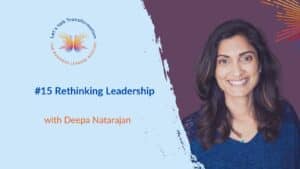“All parts are welcome ! find space & places to connect with the experiences of Self”
Wendy and I have a fun and insightful discussion on getting to know your inner leadership team, and how you can better understand the multiple parts of yourself to work on your ‘inner game of work’. We discuss the all-knowing, non-vulnerable leader and the transformational power of self enquiry.
We delve into inner voices, parts of self and a discussion on how to expand our capacity for joy, creativity, connections and playfulness to create the heightened creativity of ‘flow’. As in any system or organisation, all voices must be heard and welcomed to allow for ‘group wisdom’ and different perspectives. Normalising conversations about ‘not being ok’ and intentionally building more regenerative practices are some of the ways we can create abundance and space in our systems to ‘unformat’ uncertainty and let the answers emerge.
Wendy shares her wealth of experience, insight and wisdom from working with individuals and companies around the world.
The main insights you will get from this episode are :
– The internal family systems (IFS) model is based on the premise that our normal healthy state is not a unified mind, but a multiplicity mind; we don’t experience ourselves as a single entity and are aware of multiple voices and sub-personalities.
– Seeing Self as a multiplicity of parts is transformative in terms of developing self-awareness. The concept of Self is unique, and we can all experience it and its qualities: courage, curiosity, connection, calm, confidence, creativity, compassion and clarity (the 8 Cs).
– A useful metaphor for self-leadership is to see ourselves as CEO and all other parts of us as willing team members. IFS says welcome them, listen to them, understand them and help them unburden, just as a good leader would for their team members.
– Compassion and curiosity go hand-in-hand to shout down our inner critic but it is reflection that is required: What do I need? Why am I in pain? Can I help myself? This then leads to a self-invitation to experience calm and create connections across the different circuits in the brain to create an opportunity for transformational change in the brain.
– Being the all-knowing, non-vulnerable leader is often the ultimate aim, but it is really a façade; self-awareness and self-management are the cornerstone of emotional intelligence and we must look at our vulnerable parts and our gut feelings and, like the conductor of an orchestra, tune in to the different ideas, sensations and emotions.
– We become blended with the experience of our parts and when we are triggered, one part of us has taken over. Triggers are trail heads that lead to a deeper understanding of ourselves and are an opportunity for transformation. Polarisations too are difficult to act upon, leading to procrastination, likewise an opportunity for self-leadership.
– When we feel ‘stuck’, we should try and tap into good experiences of Self, e.g. a calming walk, a piece of music, deep breathing. If we pay attention to what’s going on inside we can focus on what is drawing our attention: Why can’t I move forward? What is really going on? What am I afraid of? When did this start?
– An internal dialogue or conflict is often an attempt to keep ourselves safe and keep things under control, which then moves onto (internal) negotiation. We indulge in ‘busyness’ to avoid conversations, but really we should see it as an opportunity to invite curiosity.
– Unlike mindfulness and meditation, in IFS the internal dialogue is invited in and questioned! Self-enquiry is a powerful thing, and we often don’t have space for it. But we should create that space, for example, to ask ourselves: Where am I right now? In the present, past or future? Is it real stuff or imagined stuff?
– Over time, patterns emerge and capacity builds – ‘neurons that fire together wire together’. If we are scared about ceasing to exist, we must build more inner confidence, a sense of trust, inner knowing. Psychological safety requires a felt sense of safety.
– Highly functional leaders with a very effective inner sub-team experience a battle for control: can we let go of some parts and surrender? Multiple senses of identity make us more authentic and ‘whole’.
– Humans are open loop beings, and the brains of social animals create resonance with each other leading to heedful interrelating and a shared sense of understanding. This builds confidence and courage that transmits to others around us.
– We must understand that our multiple parts are burdened by past negative experiences, e.g burnout/trauma, which change the brain. Self-leadership helps those parts become unburdened without sacrificing access to the strengths that they have.
– We should seek to expand our capacity for joy, creativity, connection and playfulness in order to experience ‘flow’ (heightened creativity, implicit memory and learning); bad experiences are coded in implicit memory, and we need to ‘go there’ and access them.
– This creates a cascade in the nervous system – start with one C and the rest follow, as with people, and collective flow is very important in an inclusive environment. In IFS, all parts are welcome, even the unpleasant parts, and deep respect is given to the wisdom of pain and loss. All voices are valued, even those we don’t want to hear from.
– This can be overwhelming, but we must each find a practice that works for us, giving us the spaces and places to connect with our experiences of Self. We must listen in to what the different parts of ourselves are saying/feeling – who are the main characters?
– These are regenerative practices – self-energy is inexhaustible, indestructible and available to all. Our systems are overburdened, depleted and require regeneration, so we must hold space to tap into the source of energy. More space gives us more awareness, more opportunity and more abundance.
– IFS normalises conversations about not being OK and this is very important in today’s hybrid working environments. We must embrace life with questions and not worry about the lack of answers; if we unformat uncertainty, we can let the answers happen.









